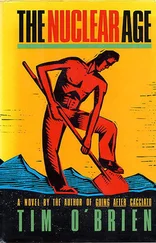‘Remember this?’ he said.
I nodded and told him I was surprised. I thought he’d burned it. Jimmy kept smiling. For a while he stared down at the photograph, his eyes very bright, then he shrugged and said, ‘Well, I did – I burned it. After Lavender died, I couldn’t…This is a new one. Martha gave it to me herself.’
They’d run into each other, he said, at a college reunion in 1979. Nothing had changed. He still loved her. For eight or nine hours, he said, they spent most of their time together. There was a banquet, and then a dance, and then afterward they took a walk across the campus and talked about their lives. Martha was a Lutheran missionary now. A trained nurse, although nursing wasn’t the point, and she had done service in Ethiopia and Guatemala and Mexico. She had never married, she said, and probably never would. She didn’t know why. But as she said this, her eyes seemed to slide sideways, and it occurred to him that there were things about her he would never know. Her eyes were gray and neutral. Later, when he took her hand, there was no pressure in return, and later still, when he told her he still loved her, she kept walking and didn’t answer and then after several minutes looked at her wristwatch and said it was getting late. He walked her back to the dormitory. For a few moments he considered asking her to his room, but instead he laughed and told her how back in college he’d almost done something very brave. It was after seeing Bonnie and Clyde, he said, and on this same spot he’d almost picked her up and carried her to his room and tied her to the bed and put his hand on her knee and just held it there all night long. It came close, he told her – he’d almost done it. Martha shut her eyes. She crossed her arms at her chest, as if suddenly cold, rocking slightly, then after a time she looked at him and said she was glad he hadn’t tried it. She didn’t understand how men could do those things. What things? he asked, and Martha said, The things men do. Then he nodded. It began to form. Oh, he said, those things. At breakfast the next morning she told him she was sorry. She explained that there was nothing she could do about it, and he said he understood, and then she laughed and gave him the picture and told him not to burn this one up.
Jimmy shook his head. ‘It doesn’t matter,’ he finally said. ‘I love her.’
For the rest of his visit I steered the conversation away from Martha. At the end, though, as we were walking out to his car, I told him that I’d like to write a story about some of this. Jimmy thought it over and then gave me a little smile. ‘Why not?’ he said. ‘Maybe she’ll read it and come begging. There’s always hope, right?’
‘Right,’ I said.
He got into his car and rolled down the window. ‘Make me out to be a good guy, okay? Brave and handsome, all that stuff. Best platoon leader ever.’ He hesitated for a second. ‘And do me a favor. Don’t mention anything about –’
‘No,’ I said, ‘I won’t.’
THE WAR WASN’T ALL TERROR and violence. Sometimes things could almost get sweet. For instance, I remember a little boy with a plastic leg. I remember how he hopped over to Azar and asked for a chocolate bar – ‘GI number one,’ the kid said – and Azar laughed and handed over the chocolate. When the boy hopped away, Azar clucked his tongue and said, ‘War’s a bitch.’ He shook his head sadly. ‘One leg, for Chrissake. Some poor fucker ran out of ammo.’
I remember Mitchell Sanders sitting quietly in the shade of an old banyan tree. He was using a thumbnail to pry off the body lice, working slowly, carefully depositing the lice in a blue USO envelope. His eyes were tired. It had been a long two weeks in the bush. After an hour or so he sealed up the envelope, wrote FREE in the upper right-hand corner, and addressed it to his draft board in Ohio.
On occasions the war was like a Ping-Pong ball. You could put fancy spin on it, you could make it dance.
I remember Norman Bowker and Henry Dobbins playing checkers every evening before dark. It was a ritual for them. They would dig a foxhole and get the board out and play long, silent games as the sky went from pink to purple. The rest of us would sometimes stop by to watch. There was something restful about it, something orderly and reassuring. There were red checkers and black checkers. The playing field was laid out in a strict grid, no tunnels or mountains or jungles. You knew where you stood. You knew the score. The pieces were out on the board, the enemy was visible, you could watch the tactics unfolding into larger strategies. There was a winner and a loser. There were rules.
I’m forty-three years old, and a writer now, and the war has been over for a long while. Much of it is hard to remember. I sit at this typewriter and stare through my words and watch Kiowa sinking into the deep muck of a shit field, or Curt Lemon hanging in pieces from a tree, and as I write about these things, the remembering is turned into a kind of rehappening. Kiowa yells at me. Curt Lemon steps from the shade into bright sunlight, his face brown and shining, and then he soars into a tree. The bad stuff never stops happening: it lives in its own dimension, replaying itself over and over.
But the war wasn’t all that way.
Like when Ted Lavender went too heavy on the tranquilizers. ‘How’s the war today?’ somebody would say, and Ted Lavender would give a soft, spacey smile and say, ‘Mellow, man. We got ourselves a nice mellow war today.’
And like the time we enlisted an old poppa-san to guide us through the mine fields out on the Batangan Peninsula. The old guy walked with a limp, slow and stooped over, but he knew where the safe spots were and where you had to be careful and where even if you were careful you could end up like popcorn. He had a tightrope walker’s feel for the land beneath him – its surface tension, the give and take of things. Each morning we’d form up in a long column, the old poppa-san out front, and for the whole day we’d troop along after him, tracing his footsteps, playing an exact and ruthless game of follow the leader. Rat Kiley made up a rhyme that caught on, and we’d all be chanting it together: Step out of line, bit a mine; follow the dink, you’re in the pink. All around us, the place was littered with Bouncing Betties and Toe Poppers and booby-trapped artillery rounds, but in those five days on the Batangan Peninsula nobody got hurt. We all learned to love the old man.
It was a sad scene when the choppers came to take us away. Jimmy Cross gave the old poppa-san a hug. Mitchell Sanders and Lee Strunk loaded him up with boxes of C rations.
There were actually tears in the old guy’s eyes.
‘Follow dink,’ he said to each of us, ‘you go pink.’
If you weren’t humping, you were waiting. I remember the monotony. Digging foxholes. Slapping mosquitoes. The sun and the heat and the endless paddies. Even in the deep bush, where you could die any number of ways, the war was nakedly and aggressively boring. But it was a strange boredom. It was boredom with a twist, the kind of boredom that caused stomach disorders. You’d be sitting at the top of a high hill, the flat paddies stretching out below, and the day would be calm and hot and utterly vacant, and you’d feel the boredom dripping inside you like a leaky faucet, except it wasn’t water, it was a sort of acid, and with each little droplet you’d feel the stuff eating away at important organs. You’d try to relax. You’d uncurl your fists and let your thoughts go. Well, you’d think, this isn’t so bad. And right then you’d hear gunfire behind you and your nuts would fly up into your throat and you’d be squealing pig squeals. That kind of boredom.
Читать дальше












